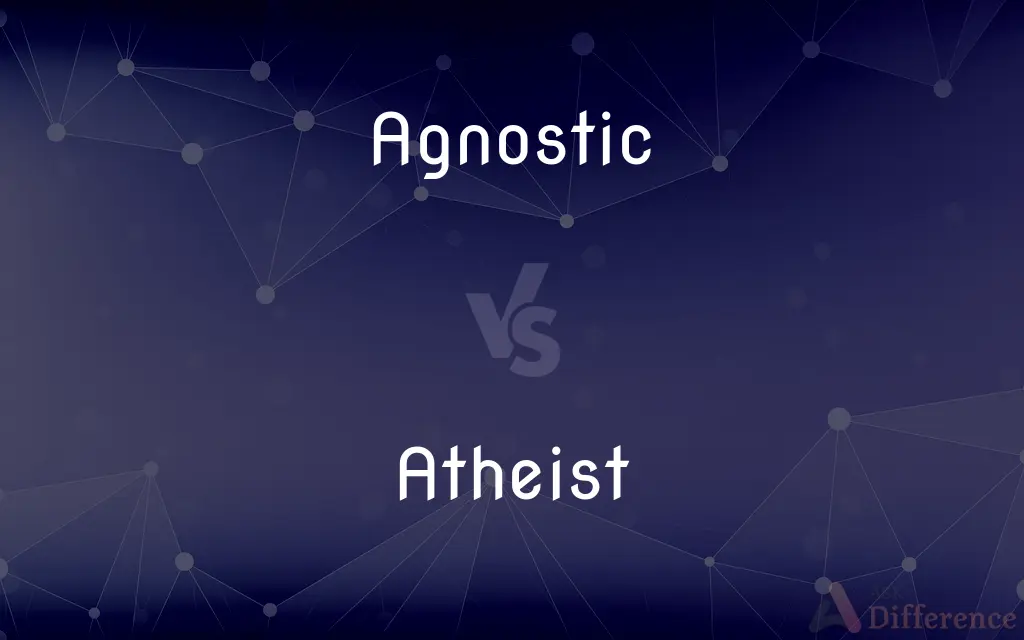Agnostic vs. Atheist — What's the Difference?
By Tayyaba Rehman — Updated on October 13, 2023
An agnostic is unsure about the existence of a god, believing it's unknowable, while an atheist denies or lacks belief in the existence of any god.

Difference Between Agnostic and Atheist
Table of Contents
ADVERTISEMENT
Key Differences
Agnostic, derived from the Greek word "agnostos" meaning "unknown or unknowable," refers to individuals who believe the truth regarding issues like the existence of God or the afterlife is inherently unknowable. Atheist, on the other hand, springs from the Greek word "atheos," which means "without gods." Atheists either disbelieve or lack belief in the existence of God or gods. While both agnostic and atheist stances involve beliefs about deities, the former maintains a position of uncertainty or skepticism, whereas the latter takes a firmer stance, either of disbelief or the absence of belief. Being an agnostic does not preclude one from believing in a higher power—it just means they believe such truths can't be known. In contrast, being an atheist means one doesn't hold any beliefs in a deity or deities. In popular discourse, the terms "agnostic" and "atheist" are sometimes used interchangeably, but their core definitions distinguish one's uncertainty from one's lack or denial of belief.
Comparison Chart
Belief on Deity
Uncertain about existence
Disbelieves or lacks belief in existence
Origin of Term
Greek "agnostos" (unknown or unknowable)
Greek "atheos" (without gods)
Stance on Afterlife
May be unknowable
Typically, no belief
View on Spiritual Truths
Believes some truths are inherently unknowable
Does not believe in religious/spiritual truths
ADVERTISEMENT
Relation to Religiosity
Can be religious or non-religious
Typically non-religious
Compare with Definitions
Agnostic
Neither affirming nor denying divine existence.
As an agnostic, she avoids taking a fixed stance on deities.
Atheist
A person who denies or lacks belief in God or gods.
He's an atheist and doesn't attend religious ceremonies.
Agnostic
Believing certain truths are inherently unreachable.
He's agnostic about the afterlife, thinking it's something humans can't ascertain.
Atheist
Not holding theistic beliefs.
His atheist standpoint led him to question religious narratives.
Agnostic
A person who believes the existence of God is unknowable.
She identifies as an agnostic because she thinks the nature of God is beyond human comprehension.
Atheist
Disbelieving in divine entities.
Being an atheist, she finds solace in nature rather than in temples.
Agnostic
Unsure about religious beliefs.
Being agnostic, he remains open to spiritual possibilities.
Atheist
Rejecting religious doctrines.
As an atheist, he champions secular values.
Agnostic
A person who believes that nothing is known or can be known of the existence or nature of God.
Atheist
Absence of belief in any deity.
Her atheist perspective is grounded in science and reason.
Agnostic
Relating to agnostics or agnosticism.
Atheist
Disbelief in or denial of the existence of God or gods.
Agnostic
One who believes that it is impossible to know whether there is a God.
Atheist
(religion) A person who does not believe in deities.
Agnostic
One who is skeptical about the existence of God but does not profess true atheism.
Atheist
(narrowly) A person who believes that no deities exist one who has no other religious belief.
Agnostic
One who is doubtful or noncommittal about something.
Atheist
(broadly) A person who rejects belief that any deities exist (whether or not that person believes that deities do not exist).
Agnostic
Relating to or being an agnostic.
Atheist
(loosely) A person who has no belief in any deities, such as a person who has no concept of deities.
Agnostic
Doubtful or noncommittal
"Though I am agnostic on what terms to use, I have no doubt that human infants come with an enormous 'acquisitiveness' for discovering patterns" (William H. Calvin).
Atheist
(uncommon) A person who does not believe in a particular deity (or any deity in a particular pantheon), notwithstanding that they may believe in another deity.
Agnostic
(Computers) Operable or functioning using any operating system or other digital technology. Often used in combination
Software that is platform agnostic.
Atheist
(proscribed) A person who does not believe in any religion (not even a religion without gods)
Agnostic
Of or relating to agnosticism or its adherents.
His agnostic viewpoint is summarized in his book.
Atheist
Of or relating to atheists or atheism; atheistic.
Agnostic
Doubtful or uncertain about the existence or demonstrability of God or other deity.
She left the church when she had become agnostic.
Atheist
To make someone an atheist.
Agnostic
Having no firmly held opinions on something.
I'm agnostic on whether ethanol is a green fuel.
He says he's agnostic concerning the Secretary's claims.
Atheist
One who disbelieves or denies the existence of a God, or supreme intelligent Being.
Agnostic
Unaware or noncommittal regarding the specific nature of the components or input with which it interacts.
The socket communications layer is agnostic with regard to its underlying transport mechanism—it is “transport-agnostic”.
The software's registration key is platform agnostic and will work on both x86 and ARM processors.
Atheist
A godless person.
Agnostic
A person who holds to a form of agnosticism, especially uncertainty of the existence of a deity.
Atheist
Someone who denies the existence of god
Agnostic
Professing ignorance; involving no dogmatic; pertaining to or involving agnosticism.
Atheist
Related to or characterized by or given to atheism;
Atheist leanings
Agnostic
One who professes ignorance, or denies that we have any knowledge, save of phenomena; one who supports agnosticism, neither affirming nor denying the existence of a personal Deity, a future life, etc.
Agnostic
A person who doubts truth of religion
Agnostic
Uncertain of all claims to knowledge
Agnostic
Skeptic of absolute religious claims.
Her agnostic views made her question dogmatic teachings.
Common Curiosities
Is an atheist someone who denies God's existence?
An atheist either denies or lacks belief in the existence of God or gods.
Do all atheists reject religious practices?
While many atheists might not believe in religious doctrines, their participation in religious practices can vary.
What does an agnostic believe?
An agnostic believes the truth about the existence of God is unknown or unknowable.
Can an agnostic be religious?
Yes, an agnostic can be religious or non-religious; they just believe certain truths are unknowable.
Is atheism strictly about denying God?
Not strictly. Atheism can be a lack of belief or an active disbelief in God or gods.
Which term denotes uncertainty about God's existence?
The term "agnostic" denotes uncertainty or the belief that it's unknowable.
Are all agnostics non-committal about religious matters?
Not all. Some agnostics might have firm beliefs about certain topics while remaining uncertain about others.
Which word comes from the Greek for "without gods"?
The word "atheist" comes from the Greek "atheos," meaning "without gods."
Does being agnostic mean one is skeptical of all religions?
Not necessarily. Being agnostic pertains more to beliefs about what can or cannot be known.
What do atheists think about religious rituals?
Atheists' views on rituals vary, but they typically don't believe the religious significance ascribed to them.
Can an atheist find value in religious teachings?
Yes, some atheists might appreciate the moral or philosophical aspects of religious teachings without believing in their divine origin.
Can someone be both agnostic and atheist?
Yes, someone can be both, meaning they lack belief in gods and also believe such truths are unknowable.
Do agnostics believe in an afterlife?
Agnostics might believe that the nature of the afterlife, if it exists, is unknowable.
Is atheism the same as secularism?
No. Atheism is about disbelief in deities, while secularism is the principle of separating religious institutions from state institutions.
Is being agnostic a middle ground between belief and disbelief?
Agnosticism is more about the belief that certain truths are unknowable, rather than a middle ground.
Share Your Discovery

Previous Comparison
Role vs. Roll
Next Comparison
Incredible vs. IncredulousAuthor Spotlight
Written by
Tayyaba RehmanTayyaba Rehman is a distinguished writer, currently serving as a primary contributor to askdifference.com. As a researcher in semantics and etymology, Tayyaba's passion for the complexity of languages and their distinctions has found a perfect home on the platform. Tayyaba delves into the intricacies of language, distinguishing between commonly confused words and phrases, thereby providing clarity for readers worldwide.














































